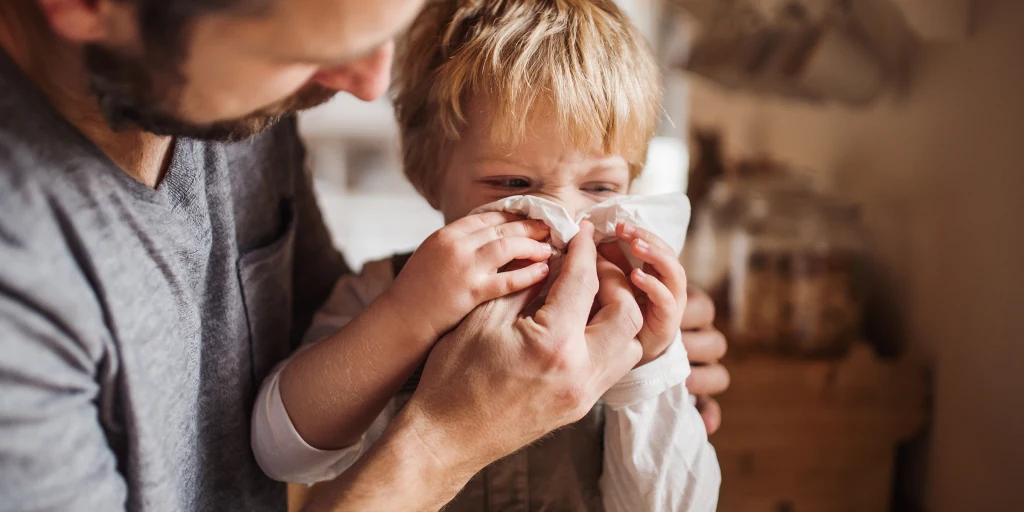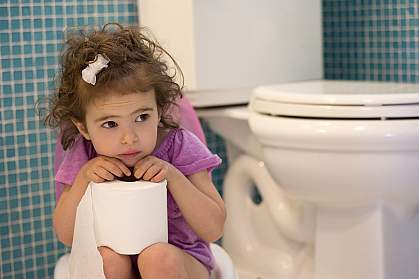Exercise Daily – It can be challenging for parents and children when our little ones fall ill. Common childhood ailments such as colds, coughs, and the flu can make our toddlers miserable and uncomfortable. According to the American Academy of Pediatrics, it’s crucial to provide remedies that are specifically made for children to ensure safety and effectiveness. For instance, a little petroleum jelly can help soothe irritated noses, while a humidifier can make it easier for kids to breathe in the steam and soften the mucus. Let’s explore the Kid-Friendly Remedies and Recipes for Common Childhood Ailments.
Vitamin C-rich foods may help them feel better and support their immune system, while frozen fruit bars can be a comforting and hydrating treat for kids who are reluctant to eat or drink. Keeping them hydrated and offering soft, healthy foods for kids can significantly aid their recovery and overall well-being.
Foods to Feed Your Kids When They’re Sick
When your little one is feeling under the weather, providing them with nourishing foods to support their recovery is essential. Here are some kid-friendly foods that can help soothe their discomfort and boost their immune system:
Chicken Soup – A Comforting Remedy
Chicken soup has long been regarded as a remedy for various illnesses, including the common cold. Its warm and comforting nature can help ease congestion and provide hydration. You can prepare a delicious chicken soup by simmering chicken, vegetables, and herbs in a flavorful broth.
Hydrating Fruits and Vegetables
Fruits and vegetables with high water content, such as watermelon, oranges, cucumbers, and celery, can help hydrate your child while providing essential vitamins and minerals. You can offer these as juices and smoothies or simply cut them into bite-sized pieces.
Warm Applesauce
Warm applesauce is gentle on the stomach and can provide comfort to a child experiencing digestive issues. The natural sugars present in apples can also help provide energy. You can warm store-bought applesauce or make your own by cooking peeled and diced apples with a touch of cinnamon.
Toast or Crackers
Plain toast or crackers are easily digestible and can help ease nausea or an upset stomach. Opt for whole grain varieties to provide some fiber and nutrients.
Remember, it’s important to present these foods to your child in a way that is appealing to them. Encourage them to eat small, frequent meals and listen to their appetite cues.

Remedies for the Common Cold
Colds are a common childhood ailment, often accompanied by a runny nose, congestion, and sneezing. While there is no cure for the common cold, you can employ various home remedies to alleviate your child’s discomfort. Here are some effective strategies:
Nasal Saline Drops or Spray
Nasal saline drops or spray can help soothe a congested nose by moisturizing the nasal passages and loosening mucus. Use a saline solution specifically made for children and follow the instructions provided. Gently tilt your child’s head back, squeeze a few drops into each nostril, and then have them blow their nose.
Steamy Bath or Shower
Creating a steamy environment can help relieve congestion and ease breathing. Take your little one into the bathroom and turn on the hot water, allowing the room to fill with steam. Sit with them for a few minutes, ensuring they are safe and away from hot water or surfaces. The steam will help loosen mucus and make it easier for them to breathe.
Plenty of Rest
Rest is crucial for your child’s recovery. Make sure they have ample time to rest and sleep. Create a comfortable and quiet environment that promotes relaxation. Encourage quiet activities such as reading or coloring to keep them occupied without exerting too much energy.
Stay Hydrated
It’s essential for your child to stay hydrated, especially when they have a cold. Offer them plenty of fluids such as water, diluted fruit juices, or warm herbal teas. Hydration helps thin mucus secretions, making it easier for your child to expel them. Encourage them to drink small sips frequently throughout the day.
Warm Saltwater Gargle
For older kids who can gargle safely, a warm saltwater gargle can provide relief for a sore throat. Mix half a teaspoon of salt in warm water and have them gargle for 15-30 seconds before spitting it out. This can help reduce inflammation and soothe the throat.
Remember, it’s important to consult your pediatrician if your child’s symptoms persist or worsen.

Soothing a Cough in Toddlers
Coughs can be quite bothersome for toddlers, causing discomfort and interrupting their sleep. Here are some home remedies that can help soothe a cough in your little one:
Honey and Warm Water
For children above the age of 1 year, a mixture of honey and warm water can provide relief from coughing. Mix one teaspoon of honey with warm water and have your child drink it. Honey has natural soothing properties and can help alleviate cough symptoms.
Elevate the Head
Elevating your toddler’s head while they sleep can help reduce coughing at night. You can place a pillow or folded towel under the mattress at the head end to create a slight incline. This can help prevent postnasal drip and reduce coughing episodes.
Steam Inhalation
Steam inhalation can help loosen mucus and soothe a cough. Take your toddler into the bathroom and run a hot shower. Sit with them in the steamy bathroom for a few minutes, ensuring they are safe and supervised. The warm steam can help relieve congestion and ease coughing.
Honey and Lemon
For children older than 1 year, a mixture of honey and lemon can be beneficial in soothing a cough. Squeeze the juice of half a lemon into a teaspoon of honey and mix well. Give this mixture to your child in small amounts. The acidic properties of lemon combined with the soothing effects of honey can help alleviate cough symptoms.
Relieving Flu Symptoms
When your child has the flu, they may experience symptoms such as fever, body aches, fatigue, and loss of appetite. Here are some home remedies that can help ease flu symptoms:
Fluids and Hydration
Encourage your child to drink plenty of fluids when they have the flu. Offer them water, diluted fruit juices, herbal teas, or clear broths. Hydration is crucial to prevent dehydration and support the body’s healing process.
Rest and Sleep
Rest is essential for your child’s recovery from the flu. Allow them to take frequent naps and ensure they have a quiet and comfortable environment to rest in. Limit physical activity until they have fully recovered.
Nutritious, Easy-to-Digest Foods
When your child has the flu, their appetite may decrease. Offer them nutritious foods that are easy to digest, such as soups, boiled rice, or steamed vegetables. These foods provide essential nutrients and help support their immune system.
Over-the-Counter Medications
Over-the-counter medications should only be used under the guidance of a pediatrician. Acetaminophen or ibuprofen may be recommended to alleviate fever and body aches in older children. However, always consult your pediatrician before administering any medication to your child.
Managing Diarrhea in Children
Diarrhea can be distressing for both children and parents. It’s important to manage diarrhea properly to prevent dehydration and promote recovery. Here are some home remedies to help manage diarrhea in children:
Fluid Replacement
Diarrhea can lead to dehydration, so it’s crucial to replace lost fluids. Offer your child clear liquids such as water, diluted fruit juices, clear broths, or oral rehydration solutions. Small, frequent sips are better tolerated than large quantities at once.
BRAT Diet
The BRAT diet (bananas, rice, applesauce, and toast) is often recommended for children with diarrhea. These foods are easy to digest and can help bind the stool. However, it’s important to note that the BRAT diet alone may not provide all the necessary nutrients for your child’s recovery. It’s best to gradually introduce a variety of bland, easy-to-digest foods such as boiled potatoes, steamed carrots, and lean proteins like chicken or tofu.
Probiotics
Probiotics are beneficial bacteria that can help restore the balance of gut flora and aid in the recovery from diarrhea. You can find probiotics in yogurt or as over-the-counter supplements specifically formulated for children. Consult your pediatrician for appropriate probiotic recommendations for your child’s age.
Avoiding Certain Foods
During episodes of diarrhea, it’s best to avoid certain foods that can worsen symptoms or irritate the digestive system. These include greasy or fried foods, spicy foods, dairy products (if your child is lactose intolerant), and foods high in fiber. Opt for mild, low-fiber foods and gradually reintroduce a regular diet as your child’s stools become more solid.
Remember, if your child’s diarrhea persists for more than a couple of days, if there is blood in their stool, or if they show signs of dehydration (excessive thirst, dry mouth, decreased urine output), it’s important to consult a pediatrician for proper evaluation and guidance.

Using Saline to Help Your Child Breathe
Nasal congestion can be particularly troublesome for young children, making it difficult for them to breathe and sleep. Saline solution can help alleviate congestion and make breathing easier. Here’s how you can use saline to help your child breathe:
Saline Nasal Drops
You can purchase saline nasal drops or make your own saline solution at home. Mix ¼ teaspoon of salt with 1 cup of warm water to make a homemade saline solution. Use a clean dropper to administer a few saline drops into each nostril, followed by gentle suction with a nasal bulb syringe. This can help loosen mucus and clear the nasal passages.
Saline Nasal Spray
Saline nasal sprays are also available and can be used to moisten the nasal passages and relieve congestion. Follow the instructions on the packaging for appropriate usage and dosage based on your child’s age.
Using saline drops or spray before feedings or bedtime can help your child breathe more comfortably and improve their overall well-being.
The Magic of Chicken Soup
Chicken soup has been a go-to remedy for generations when it comes to treating colds and flu symptoms. Here’s a simple recipe for a delicious and nutritious homemade chicken soup:
Homemade Chicken Soup Recipe
Ingredients:
- 1 whole chicken, cut into pieces
- 2 carrots, peeled and chopped
- 2 celery stalks, chopped
- 1 onion, chopped
- 4 cloves of garlic, minced
- 8 cups of chicken broth
- 1 bay leaf
- 1 teaspoon dried thyme
- Salt and pepper to taste
Instructions:
- In a large pot, heat some oil over medium heat. Add the chopped onions, carrots, celery, and minced garlic. Sauté until the vegetables become tender.
- Add the chicken pieces to the pot and brown them on all sides.
- Pour in the chicken broth, and add the bay leaf and dried thyme. Season with salt and pepper.
- Bring the soup to a boil, then reduce the heat and let it simmer for about 1 hour, or until the chicken is fully cooked and tender.
- Remove the chicken pieces from the pot and shred the meat using a fork. Discard the bones and return the shredded chicken to the soup.
- Adjust the seasoning if needed and simmer for an additional 10 minutes.
- Serve the chicken soup warm and comforting to your little one.
Chicken soup provides hydration, warmth, and nutrients that can help soothe a sore throat, ease congestion, and support your child’s recovery. Plus, it’s delicious and comforting!
Harnessing the Power of Humidifiers
Humidifiers can be a helpful tool in relieving congestion and dryness in the air, making it easier for your child to breathe. Here are some tips for using humidifiers effectively:
Cool Mist or Warm Mist Humidifier
There are two main types of humidifiers: cool mist and warm mist. Both can be effective, but cool mist humidifiers are generally recommended for use around children to avoid any risk of burns. Follow the manufacturer’s instructions for proper usage and maintenance.
Clean and Maintain Regularly
It’s important to clean and maintain your humidifier regularly to prevent the growth of bacteria or mold. Be sure to follow the cleaning instructions provided by the manufacturer. Empty and refill the water daily to prevent stagnant water.
Place the Humidifier Safely
Keep the humidifier out of reach of young children to prevent any accidental spills or injuries. Place it on a stable surface away from the reach of curious hands. Also, ensure that the humidifier is positioned in such a way that the mist is directed away from the child’s immediate vicinity to avoid excessive moisture on their bedding or clothing.
Monitor Humidity Levels
Maintaining an optimal humidity level is important to prevent the air from becoming too dry or too humid, leading to other respiratory issues. Aim for a humidity level between 30% and 50% in the room where your child spends the most time. You can use a hygrometer, a device that measures humidity, to monitor the levels and adjust the humidifier accordingly.
Use Clean, Filtered Water
Using clean, filtered water in your humidifier can help prevent the release of minerals or impurities into the air. Distilled or demineralized water is often recommended to minimize the buildup of mineral deposits in the humidifier.
Remember, while humidifiers can relieve your child’s respiratory symptoms, it’s essential to use them safely and maintain proper hygiene to avoid potential health risks.
Caring for Your Child’s Comfort
Aside from the specific remedies mentioned above, there are a few general practices you can adopt to ensure your child’s comfort and aid in their recovery:
Provide Plenty of Fluids
Encourage your child to drink plenty of fluids, such as water, clear broths, and diluted fruit juices. Staying hydrated helps thin mucus, soothes irritation, and prevents dehydration.
Ensure Adequate Rest
Proper rest is crucial for your child’s immune system to fight off the illness. Make sure they get enough sleep and take frequent naps as needed. Allow them to stay home from school or daycare until they feel better to avoid spreading the illness to others.
Maintain a Comfortable Room Environment
Keep your child’s room clean, well-ventilated, and at a comfortable temperature. Use soft bedding, adjust the room lighting, and create a calm and soothing atmosphere to promote relaxation and better sleep.
Offer Extra Love and Care
During times of illness, your child may need extra attention and reassurance. Offer comfort, cuddles, and gentle care to make them feel safe and loved. Your presence and support can go a long way in helping them recover.

Conclusion
Taking care of a sick child can be a challenging task, but with the right remedies and recipes, you can provide them with comfort and support for their recovery. Remember to consult your child’s pediatrician before trying new remedies, especially if your child has underlying health conditions or is on medication. By utilizing natural home remedies, offering nourishing foods, and creating a soothing
FAQs – Kid-Friendly Remedies and Recipes for Common Childhood Ailments
Q: Are these remedies safe for children of all ages?
A: It’s important to consider your child’s age when using remedies. Some remedies, like honey, are not safe for children under 1 year old. Always consult with your child’s pediatrician before trying new remedies.
Q: How long should I wait to see improvement after using these remedies?
A: The duration of recovery may vary depending on the severity of the illness. In most cases, you should start to see improvement within a few days. If symptoms persist or worsen, consult your child’s healthcare provider.
Q: Can I use over-the-counter cough medicines for my child’s cough?
A: Over-the-counter cough medicines are not recommended for children under the age of 4. It’s best to consult your child’s pediatrician for appropriate cough remedies based on age and symptoms.
Q: Can I give my child vitamins and supplements during their illness?
A: While providing a balanced diet is important, it’s generally best to consult with your child’s pediatrician before giving them any additional vitamins or supplements, especially during illness.
Q: When should I seek medical attention for my child’s illness?
A: If your child’s symptoms persist, worsen, or if they develop new symptoms, it’s important to seek medical attention. Additionally, if your child has difficulty breathing, shows signs of dehydration, or has a high fever, consult your child’s healthcare provider promptly.




